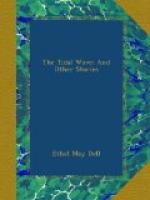He paused for her answer. But she made none. Only in her trouble it seemed to him that she clung to his support.
He drew her a little closer to him.
“Molly,” he said very tenderly, “do you want me, child? Shall I stay?”
And at length she answered him, realising that it was to this man, hero or no hero, she had given her heart.
“Yes, stay, Gerald!” she whispered earnestly. “I want you.”
* * *
Perhaps he understood her better than she thought. Perhaps Charlie’s last words to him had taught him a wisdom to which he had not otherwise attained. Or perhaps his love was large enough to cover and hide all that might be lacking in that which she offered to him.
But at least neither then nor later did he ever seek to know how deeply the glamour of another man’s heroism had pierced her heart. She tried to whisper an explanation, but he hushed the words unuttered.
“It is all right, child,” he said. “I am satisfied. It is only the lookers-on who are allowed to see all the cards. I think when we meet him again he will tell us that we played them right.”
There was a deep quiver in his voice as he spoke, but there was no lack of confidence in his words. Looking upwards, Molly saw that his eyes were full of tears.
* * * * *
THE SECOND FIDDLE
A low whistle floated through the slumbrous silence and died softly away among the sand-dunes.
The man who sat in the little wooden summer-house that faced the sea raised his head from his hand and stared outwards. The signal had scarcely penetrated to his inner consciousness, but it had vaguely disturbed his train of thought. His eyes were dull and emotionless as he stared across the blue, smiling water to the long, straight line of the horizon. They were heavy also as if he had not slept for weeks, and there were deep lines about his clean-shaven mouth.
Before him on the rough, wooden table lay a letter—a letter that he knew by heart, yet carried always with him. The writing upon it was firm and regular, but unmistakably a woman’s. It began: “Dear Hugh,” and it ended: “Yours very sincerely,” and it had been written to tell him that because he was crippled for life the writer could no longer entertain the idea of sharing hers with him.
There had been a ring enclosed with the letter, but this he had not kept. He had dropped it into the heart of a blazing fire on the day that he had first been able to move without assistance. He had not done it in anger. Simply the consciousness of possessing it had been a pain intolerable to him. So he had destroyed it; but the letter he had kept through all the dreary months that had followed that awful time. It was all that was left to him of one whom he had loved passionately, blindly, foolishly, and who had ceased to love him on the day, now nearly a year ago, when his friends had ceased to call him by the nickname of Hercules, that had been his from his boyhood.




